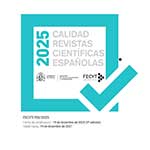PRIVACY IN THE DIGITAL AGE: LEGAL ANAYLISIS AND THE YOUTH APPROACH ABOUT PERCEPTIONS AND PRACTICES
Abstract
In Argentina, the right to privacy is constitutionally recognized, and protects an area referring to individual life free from the intrusion of strangers. This right takes on particular importance in the digital era - in which personal information can be easily collected and disseminated through the network - making it necessary to take a rigorous legal approach to this new reality. This
paper addresses one of the many issues raised by the use of social networks, such as the violation of privacy, reflecting on the different responses provided by the Argentine legal system. At the same time, it seeks to explore to what extent these issues are known and of concern in a population group doubly involved, such as law students. To this end, a mixed methodology was implemented: on the one hand, a descriptive study with a qualitative approach was carried out in order to conduct a doctrinal analysis on the subject and, from a legal perspective, to examine the national regulations. In addition, and as a complement, a survey was applied to a group of young law students from an Argentine public university to find out their perception of privacy and the behaviours assumed in virtual spaces. The results indicate that the participants seem to be aware of the right to privacy as a fundamental right and its relevance. However, although most of them say that they take measures to protect their privacy, these strategies are not the same as those they say they carry out in the online world.
Article download
License
In order to support the global exchange of knowledge, the journal Derecom. Derecho de la Comunicación is allowing unrestricted access to its content as from its publication in this electronic edition, and as such it is an open-access journal. The originals published in this journal are the property of the Complutense University of Madrid and any reproduction thereof in full or in part must cite the source. All content is distributed under a Creative Commons Attribution 4.0 use and distribution licence (CC BY 4.0). This circumstance must be expressly stated in these terms where necessary. You can view the summary and the complete legal text of the licence.







